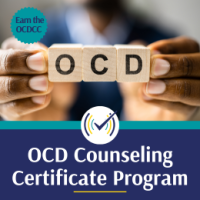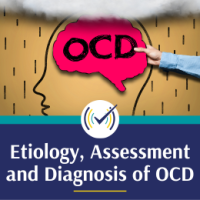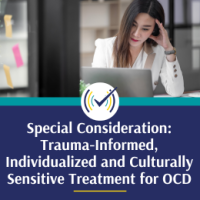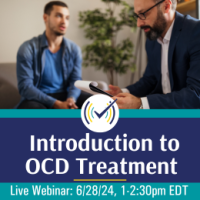Evidence-Based Treatments for OCD: Exposure and Response Prevention (ERP) is Module Two of the 3-course Obsessive-Compulsive Disorder Counseling Certificate Program (OCDCC). For more information on the OCDCC and discounted enrollment in the full program, please visit this page.
Obsessive-Compulsive Disorder (OCD) is a complex condition, and the severity of symptoms can vary widely from person to person. The pervasive nature of the disorder, as well as complicating factors such as co-occurring mental health conditions, can lead to clinician anxiety and uncertainty about how to best proceed with treatment. Therefore, comprehensive training in utilizing evidence-based strategies is crucial to ensuring that individuals with OCD receive the best quality of care possible.
This presentation will provide an overview of the existing evidence-based treatments for OCD and related disorders, with an in-depth look at Cognitive Behavioral Therapy with Exposure and Response Prevention (ERP), which has long been considered the gold standard for treatment. Clinicians will receive intensive training on the theoretical principles of new learning through exposure, will learn how to develop individualized exposure hierarchies to best target OCD symptoms, and will be given direct guidance on how to provide exposure opportunities in a variety of treatment settings. Reviews of the literature indicate that ERP combined with psychotropic medications may improve outcomes; therefore, an overview of the psychopharmacological treatment of OCD, as well as recommendations for multidisciplinary collaboration, will be provided.
This is a non-interactive, self-study course that offers over 6 hours of recorded video instruction, a post-test and a course evaluation.
From the time of registration, you have six months to access the coursework.
Upon completion of this training, professionals will be able to do the following:
- Explain the rationale for utilizing emotional exposure strategies for the management of OCD symptoms.
- Describe two theoretical principles of exposure.
- Create an individualized exposure hierarchy using a sample case.
- Discuss the benefits and challenges of incorporating psychopharmacological interventions for individuals with OCD.
Melanie Smith, PhD, LMHC, CEDS-S
Melanie Smith, PhD, LMHC, CEDS-S, is the Director of Training for The Renfrew Center for Eating Disorders. In this role, she provides ongoing training, supervision and consultation to clinicians across disciplines for the purpose of continually assessing and improving competence in the treatment of eating disorders. Dr. Smith is co-author of The Renfrew Unified Treatment for Eating Disorders and Comorbidity Therapist Guide and Workbook (Oxford University Press), is a Certified Eating Disorders Specialist and Approved Supervisor, and is a Certified Therapist and Trainer for the Unified Protocol for the Transdiagnostic Treatment of Emotional Disorders (UP). In addition to her work with the Renfrew Center, Dr. Smith maintains a telehealth private practice specializing in the supervision and consultation of registered mental health counselor interns (Florida) and individuals seeking eating disorder specialist certification through the International Association of Eating Disorders Professionals (iaedp).
You can find more information about Dr. Smith here and the Renfrew Center here
Credit Hours: This course consists of 6 continuing education hours of credit.
Counselors: Telehealth Certification Institute, LLC has been approved by NBCC as an Approved Continuing Education Provider, ACEP No, 6693. Programs that do not qualify for NBCC credit are clearly identified. Telehealth Certification Institute, LLC is solely responsible for all aspects of the programs.
Telehealth Certification Institute, LLC is recognized by the New York State Education Department's State Board for Mental Health Practitioners as an approved provider of continuing education for Licensed Mental Health Counselors. #MHC-0048.
Marriage and Family Therapists: Many MFT licensing boards accept our courses or one of the approvals which we have from professional associations. You can check with your board to determine if your licensing board would accept this course.
Social Workers: Telehealth Certification Institute LLC, #1609, is approved as an ACE provider to offer social work continuing education by the Association of Social Work Boards (ASWB) Approved Continuing Education (ACE) program. Regulatory boards are the final authority on courses accepted for continuing education credit. ACE provider approval period: 05/02/2024 – 05/02/2027. Social workers completing this course receive 6 clinical continuing education credits.
Telehealth Certification Institute, LLC is recognized by the New York State Education Department's State Board for Social Work as an approved provider of continuing education for Licensed Social Workers #SW-0435.
Addiction Professionals: This course has been approved by Telehealth Certification Institute LLC, as a NAADAC Approved Education Provider, for educational credits. NAADAC Provider #193104, Telehealth Certification Institute LLC is responsible for all aspects of the programming.
Psychologists: Telehealth Certification Institute LLC is approved by the American Psychological Association to sponsor continuing education for psychologists. Telehealth Certification Institute LLC maintains responsibility for this program and its content.
Telehealth Certification Institute, LLC is recognized by the New York State Education Department’s State Board for Psychology as an approved provider of continuing education for Licensed Psychologists #PSY-0128.
Art Therapists: Telehealth Certification Institute, LLC is recognized by the New York State Education Department's State Board for Mental Health Practitioners as an approved provider of continuing education for Licensed Creative Arts Therapists #CAT-0093.
Other Professionals: This course qualifies for 360 minutes of instructional content as required by many national, state and local licensing boards and professional organizations. Retain your certificate of completion and contact your board or organization for specific filing requirements.
This is a non-interactive, self-study course.
To receive your certificate of completion you must complete the course in its entirety.
To complete an Online Self Study Course, one must register, log in, select the My Courses option from the menu items, click the Course Title, complete all of the modules, complete and pass the post-test(s), and complete the course evaluation.
A grade of at least 80% or more is required to pass the post-test. Retaking the post-test is possible until the participant is able to pass the test.
Psychologists and other professionals seeking CE credit through our approval with the American Psychological Association are asked but not required to complete the course evaluation before obtaining their certificate of completion, however passing a post-test for online self-study courses, and submitting one's attendance for live on-site and live webinars is required.
You can download or print your certificate of completion by logging into your account, navigating to the course by selecting the My Courses option from the menu items, clicking the Course Title, scrolling to the Certificate of Completion section, and clicking on the Certificate of Completion link to either download it or print it.
Participants may request a printed version of their certificate of completion to be delivered by mail. A shipping/handling fee of $6.95 will be charged per request. Shipping internationally may require an additional charge.
Directions for completing a course can be found by clicking here.
This course is intended for clinicians who provide behavioral health services.
This is a non-interactive, self-study course. Teaching methods for this course include recorded lectures, videos, a post-test, and a course evaluation.
This course was recorded 1/26/24






